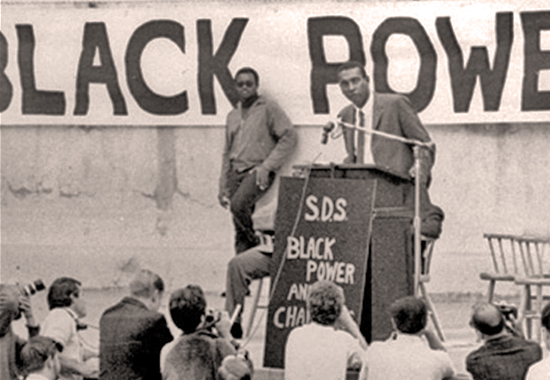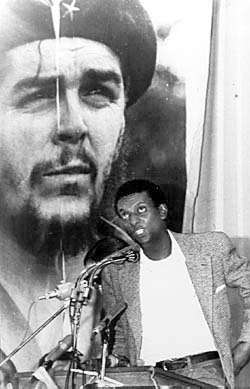STOKELY CARMICHAEL & BLACK POWER
“Consciously we have to begin to organize our people. Organize our people! Organize our people! Organize our people! Nothing else! Organize our people! Our people! All our blood, even our life must go to our people. Nothing else.”
Stokely Carmichael (later known as Kwame Ture) was a Trinidadian-American philosopher, pan-Africanist and civil rights activist. From 1961-1967, Stokely worked for the Student Nonviolent Coordinating Committee (SNCC), starting as a field organizer and eventually being elected chairman of the organization in 1966. During his time at the SNCC, he was directly involved in the organization of countless southern marches and demonstrations, including Freedom Summer. As the mid-60s wore on and violence against Blacks peacefully demanding their rights continued, Stokely became increasingly disillusioned with the tactic of non-violence.
“In order for non-violence to work, your opponent must have a conscience. The United States has none.”
This disillusionment peaked in June of 1966 after the “March Against Fear.” University of Mississippi student James Meredith was making a solitary march from Memphis, Tennessee to Jackson, Mississippi when he was shot by a sniper and critically wounded. Stokely and other fellow activists completed the march in Meredith’s name. When the marchers reached Jackson, they were arrested. Upon his release, Stokely gave the address where he popularized the phrase “Black Power”:
“There is a psychological war going on in this country and it’s whether or not Black people are going to be able to use the terms they want about their movement without white people’s blessing. We have to tell them we are going to use the term “Black Power” and we are going to define it because Black Power speaks to us. We can’t let them project Black Power because they can only project it from white power and we know what white power has done to us. We have to organize ourselves to speak from a position of strength and stop begging people to look kindly upon us. We are going to build a movement in this country based on the color of our skin that is going to free us from our oppressors and we have to do that ourselves.”
Stokely expounded on the meaning of Black Power in October 1966, during his famous Black Power speech at the University of California-Berkeley:
"We maintain, whether they like it or not, we gonna use the word “Black Power” and let them address themselves to that; but that we are not goin’ to wait for white people to sanction Black Power. We are tired of waiting; every time Black people move in this country, they’re forced to defend their position before they move. It’s time that the people who are supposed to be defending their position do that. That’s white people. They ought to start defending themselves as to why they have oppressed and exploited us."
In his 1967 book Black Power: The Politics of Liberation, Stokely further described Black Power as
“a call for Black people in this country to unite, to recognize their heritage, to build a sense of community. It is a call for Black people to define their own goals, to lead their own organizations.”
For the duration of his life, Stokely Carmichael traveled nationally and internationally, spreading his vision of Black power and Black pride. 50 years later, his message of Black Power can be seen and felt in the contemporary movement for Black liberation that was catalyzed by Ferguson and continues to gain strength each day. This Black History Month, we encourage our brothers and sisters to continue organizing and solidifying our collective power!








